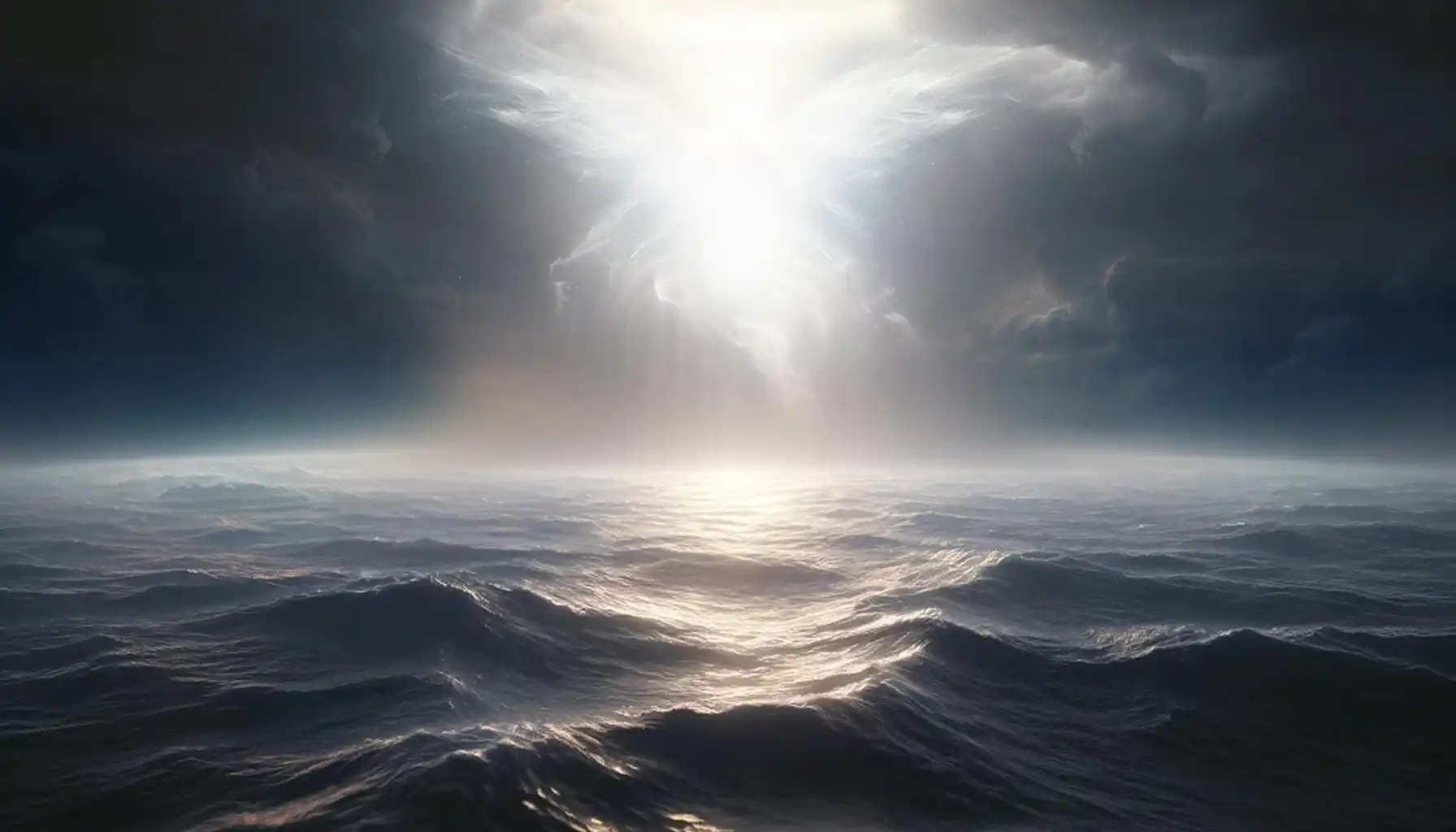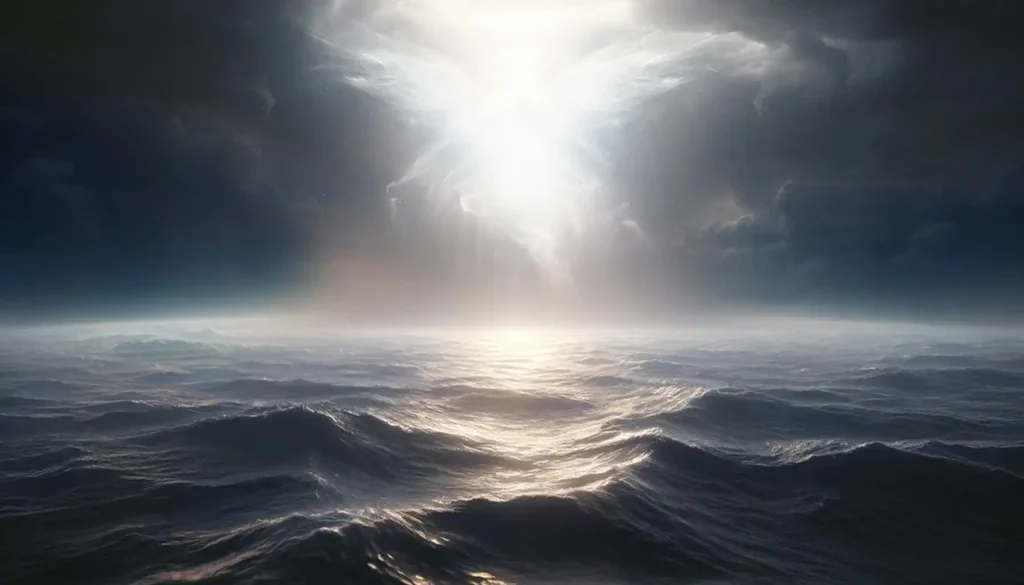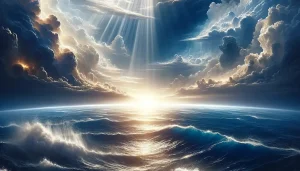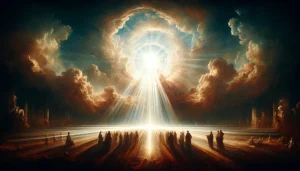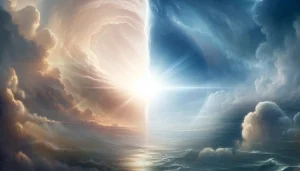And the earth was formless and void, and darkness [was] over [the] face of [the] deep; and [the] Spirit of God [was] hovering over [the] face of the waters.

וְ Conjunction וְ 50,260x and הָ Definite article הַ 23,886x the אָ֗רֶץ Noun common, feminine, singular אֶרֶץ 2,504x earth, ground, land
And the earth
הָיְתָ֥ה Verb Qal, Perfect, 3rd-Person, Feminine, Singular הָיָה 3,561x to be
was
תֹ֨הוּ֙ Noun common, masculine, singular תֹּהוּ 20x formless, empty, chaos
formless
וָ Conjunction וְ 50,260x and בֹ֔הוּ Noun common, masculine, singular בֹּהוּ 3x void, emptiness
and void
|
וְ Conjunction וְ 50,260x and חֹ֖שֶׁךְ Noun common, masculine, singular חֹשֶׁךְ 80x darkness
and darkness
עַל Preposition עַל 5,771x upon, over, above ־ Maqaf It connects words or parts of words, similar to an English hyphen.
over
פְּנֵ֣י Noun common, masculine/feminine, plural, construct פָנִים / פָּנֶה 2,128x before, face, faces
face of
תְה֑וֹם Noun common, masculine/feminine, singular תְּהוֹם 36x deep, abyss
deep
|
וְ Conjunction וְ 50,260x and ר֣וּחַ Noun common, feminine, singular, construct רוּחַ 378x spirit, breath, wind
and Spirit of
אֱלֹהִ֔ים Noun common, masculine, plural אֱלֹהִים 2,600x God, gods, god
God
מְרַחֶ֖פֶת Verb Piel, participle, feminine, singular רָחַף 3x to hover, to flutter
hovering
עַל Preposition עַל 5,771x upon, over, above ־ Maqaf It connects words or parts of words, similar to an English hyphen.
over
פְּנֵ֥י Noun common, masculine/feminine, plural, construct פָנִים / פָּנֶה 2,128x before, face, faces
face of
הַ Conjunction הַ 23,886x the מָּֽיִם Noun common, masculine, plural מַיִם 582x waters, water
the waters
׃ Sof pasuq It marks the end of a verse, similar to a period in English.

Language
וְהָאָ֗רֶץ (and the earth )ארץ means land or earth. It usually refers to the planet or ground in the Bible but also symbolically represents the material basis for life.- Psalm 115:16, “The heavens are the LORD’s heavens, but the earth he has given to the children of man.”
תֹ֙הוּ֙ וָבֹ֔הוּ (formless and void )תֹהוּ (Tohu) often interpreted as “waste” or “desolation,” signifies disorder and confusion.בֹהוּ (Bohu) reinforces the state of emptiness and formlessness. “Tohu and Bohu” together depict a state of chaos and absence of order, indicating a lack of order and purpose that God is about to transform.- Jeremiah 4:23, “I looked on the earth, and behold, it was without form and void; and to the heavens, and they had no light.”
וְחֹ֖שֶׁךְ (and darkness )- Exodus 10:22, “So Moses stretched out his hand toward heaven, and there was pitch darkness in all the land of Egypt three days.”
עַל־פְּנֵ֣י תְה֑וֹם (over [the] face of [the] deep )תְּהוֹם (deep) represents primordial chaos and the unfathomable abyss. In ancient Near Eastern cultures, it’s often akin to a chaotic water monster defeated by deities in creation myths, but here, it’s under God’s control, showcasing His unquestionable authority over chaos.- Proverbs 8:27, “When he established the heavens, I was there; when he drew a circle on the face of the deep.”
וְר֣וּחַ (and [the] Spirit )ר֣וּחַ can mean “wind,” “breath,” or “spirit.” In this context, it refers to God’s Spirit, not an impersonal force, but God’s powerful presence, initiating the act of creation, symbolizing life-giving power and divine action.- Genesis 6:3, “Then the LORD said, ‘My Spirit shall not abide in man forever, for he is flesh: his days shall be 120 years.'”
אֱלֹהִ֔ים (of God )אֱלֹהִ֔ים (Elohim) is a plural form, it’s understood as singular when referring to the God of Israel. This term encapsulates God’s sovereignty, majesty, and supreme power, central to the monotheistic faith of Judaism and subsequently Christianity.- 1 Samuel 17:45, “David said to the Philistine, ‘You come against me with sword and spear and javelin, but I come against you in the name of the LORD Almighty, the God of the armies of Israel, whom you have defied.’
מְרַחֶ֖פֶת (hovering )רחף , which means to hover or move gently. It is a participle in the Piel stem, indicating an intensive, continuous action. This speaks not just of a passive presence but of God’s Spirit actively engaging with creation. It’s an image of dynamic, life-giving action, reminiscent of a bird fluttering over its young, symbolizing God’s nurturing and formative power in the midst of formlessness and void.- Deuteronomy 32:11, “Like an eagle that stirs up its nest, that flutters over its young, spreading out its wings, catching them, bearing them on its pinions.”
עַל־פְּנֵ֥י הַמָּֽיִם (over [the] face of the waters )על means “over” or “upon” andפנים means “face,” which together describe presence or in front of something. The termמים means “waters” and in the context of Genesis, refers to the primordial or chaotic waters present before creation. This phrase highlights God’s control and the looming act of creation, separating waters to establish order.- Psalm 104:6, “You covered it with the deep as with a garment; the waters stood above the mountains.”
Insights
- Creator and Sustainer:
וְרוּחַ אֱלֹהִים (and the Spirit of God) highlights the active presence of God’s Spirit in creation, pointing to His role as both Creator and Sustainer of life. This Spirit, understood by Christians as part of the Triune God, was present at the creation, emphasizing continuity between the Old Testament understanding of God and the full revelation of the Trinity in the New Testament. - Order from Chaos: The phrase
תֹ֙הוּ֙ וָבֹ֔הוּ (formless and void) coupled withוְחֹ֖שֶׁךְ (and darkness) describes the earth in a state of chaos. God’s initial act of creation involved bringing order out of this chaos, demonstrating His sovereign power and foreshadowing the greater spiritual restoration accomplished through Christ. - God’s Omnipresence and Omniscience: The imagery of the Spirit of God hovering over the “deep” signifies God’s intimate knowledge of and presence in His creation. It denotes not a distant deity, but an involved Creator, a foundational concept for the relational nature of God as depicted in both the Old and New Testaments.
- Trinitarian Echoes: While the full revelation of the Trinity is a New Testament revelation, Christian theology perceives hints of this Trinitarian nature of God in verses like Genesis 1:2. The “Spirit of God” present over the waters is identified with the Holy Spirit, a distinct person of the Trinity, affirming the involvement of Father, Son, and Holy Spirit in the act of creation.
- Jesus in Creation: Christian theology often connects passages like Genesis 1:2 with New Testament teachings about Christ. John 1:1-3, for example, identifies the Word (Logos, understood as Christ) with God and as a central agent in creation. This link reinforces the pre-existence of Christ before all creation and His divine nature.
- New Creation in Christ: Just as the Spirit of God moved to transform the chaos in Genesis, the New Testament teaches that God’s Spirit is active in the regeneration of believers, making them a new creation in Christ (2 Corinthians 5:17). This spiritual rebirth is a profound transformation from chaos to order, darkness to light, death to life.
Cross-References
“The infallible rule of interpretation of Scripture is the Scripture itself. Therefore, when there is a question about the true and full meaning of any Scripture (which is not manifold, but one), that meaning must be searched out and ascertained by other places that speak more clearly.” (WCF 1.9)
- Job 26:7, “He stretches out the north over the void and hangs the earth on nothing.”
- This verse speaks to God’s act of creation, which is central to Genesis 1:2, showing His sovereign power over the universe, including the formless and empty earth.
- Psalm 104:30, “When you send forth your Spirit, they are created, and you renew the face of the ground.”
- Parallel to the Spirit of God hovering over the waters in Genesis 1:2, this verse emphasizes the life-giving power of God’s Spirit in the act of creation.
- Jeremiah 4:23, “I looked on the earth, and behold, it was without form and void; and to the heavens, and they had no light.”
- Recalling the language of Genesis 1:2, Jeremiah describes a return to chaos, a judgment from God that undoes His creation work, highlighting the importance of His sustaining power.
- John 1:1-3, “In the beginning was the Word, and the Word was with God, and the Word was God. He was in the beginning with God. All things were made through him, and without him was not any thing made that was made.”
- These verses in John connect the creation account in Genesis with Jesus, the Word, emphasizing His divinity and central role in the creation.
- Isaiah 45:18, “For thus says the LORD, who created the heavens (he is God!), who formed the earth and made it (he established it; he did not create it empty, he formed it to be inhabited!): ‘I am the LORD, and there is no other.'”
- This verse reaffirms God’s intentional act of creation from Genesis 1:2, not for chaos but for habitation, emphasizing His uniqueness and sovereignty.
- Hebrews 11:3, “By faith we understand that the universe was created by the word of God, so that what is seen was not made out of things that are visible.”
- This passage in Hebrews underscores the power of God’s word in creating the universe, aligning with the creation narrative of Genesis 1 and the power of God’s word to bring order to chaos.
- Revelation 4:11, “Worthy are you, our Lord and God, to receive glory and honor and power, for you created all things, and by your will they existed and were created.”
- John’s vision in Revelation points back to the creation account in Genesis 1:2, giving all honor to God the Creator, who brings form and purpose out of chaos.
